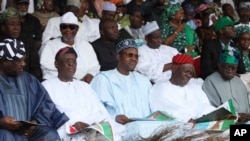The newly elected presidential candidate of Nigeria’s main opposition All Progressives Congress (APC) said Friday that if he won February’s general election, he would resolve the country’s security failures.
General Muhammadu Buhari said among the main challenges would be improving intelligence gathering, which repeatedly has been found wanting in the face of terrorist attacks.
Buhari is a former Nigerian head of state. He seized power in a coup in 1983 and ruled as head of a military junta until he was overthrown by another general, Ibrahim Babangida, in 1985. He had earlier served as the country’s federal commissioner for petroleum.
After being nominated to run this time, Buhari expressed concern that some politicians could undermine the Independent National Electoral Commission’s ability to administer a credible and transparent vote.
“We think it will be the last thing that the PDP [People’s Democratic Party] government will allow a free, fair and credible election. The examples in Ekiti and Osun [states] this year proved us right,” said Buhari.
Nigeria has a history of controversial elections, with observers repeatedly reporting large-scale fraud, disorganization and intimidation of voters.
Disputed election results have often set off violence. According to Human Rights Watch, up to 800 people were killed in violence after the 2011 polls, which saw President Goodluck Jonathan elected to his first full term.
Jonathan and members of his administration have pledged several times that the February election would be credible and transparent despite the criticisms.
Concern about corruption
In an interview with VOA, Buhari said the governing PDP was to blame for corruption, which he contended has become institutionalized in Nigeria.
“People have expressed extreme concern about corruption in the country. We have to develop a way to stop corruption. If we don’t stop corruption, as some of the feature article writers say in Nigeria, corruption will kill Nigeria,” said Buhari.
He said corruption had rendered government institutions unable to address the needs of the people.
“From that day we are sworn in, anybody that is responsible for state resources or the treasury and at the local government, there would be proper auditing according to financial instructions," and those found wanting would be prosecuted, Buhari said.
PDP officials have strongly denied graft accusations against the government. They said Jonathan’s administration has been at the forefront of combating graft.
Political observers have often accused politicians of taking advantage of ethnic and religious differences to win elections. Buhari said conditions could get worse if not addressed.
“This extreme religious problem in Nigeria is a recent phenomenon and is very unfortunate, because capable people may be denied participation at the expense of government efficiency because they belong to one religion or the other,” said Buhari.
Fighting Boko Haram
The government has waged a five-year battle against the Islamist insurgent militant group Boko Haram. In April, the militants kidnapped more than 200 schoolgirls in Chibok in northern Nigeria. Their whereabouts remain unknown.
In July, the militants also attacked Buhari’s convoy, killing several of his aides.
Buhari said military and security agencies had been ineffective in combating Boko Haram violence. He also said the administration had failed to provide security agencies with the weapons they need to carry out their mission successfully.
Buhari outlined measures that he said could resolve the country’s security challenges.
“Intelligence gathering has to be improved,” he said. “Specifically, what came out of the inefficient way the military is conducting operations against Boko Haram is extreme corruption in the system. … The soldiers could not travel, not because they were afraid of the insurgents, but because they cannot face the insurgents with inferior weapons, or without ammunition.”





